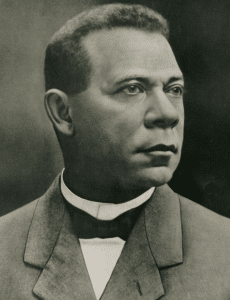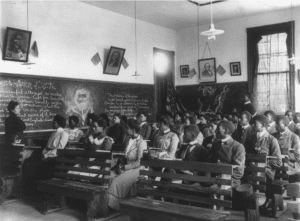Booker T. Washington can be a controversial, and often misunderstood, figure in US history. As a black man and formerly enslaved person living in the South, he was criticized for being an “apologist” to white people in the late 19th and early 20th centuries. How should we remember Washington? And what kind of Booker T. Washington APUSH exam topics should you prepare for? Keep reading to find out.
Who was Booker T. Washington?

Booker T. Washington, shown above, in 1911. (Source)
Booker T. Washington was many things: he was a public orator who is famous for his speeches (more on that later); he was an educator who began one of the most famous and earliest black colleges, the Tuskegee Institute; and he was a big time philanthropist who was responsible for directing mass amounts of money to black causes following the Civil War and Reconstruction. All of this is pretty impressive for a man who was formerly enslaved.
It was this mix of occupations that made Washington controversial, and, perhaps, led to him being a misplaced figure in history. Let’s look at each of his occupations one by one.
Booker T. Washington: Formerly Enslaved
Washington was born in Virginia on April 5, 1856. As a black boy in the South prior to the Civil War, he was enslaved and worked many jobs as a young child. After Emancipation, Washington continued his education and eventually studied at Hampton University, a college established in Virginia for freedmen.
It was in his early life that Washington began to develop a view of education for black people that would become a part of his legacy. As stated in his autobiography, Up From Slavery, “At Hampton I not only learned that it was not a disgrace to labor, but learned to love labor, not alone for its financial value, but for labor’s own sake and for the independence and self-reliance which the ability to do something which the world wants done brings.” This emphasis on manual labor – and an obsession with cleanliness – Booker T. Washington began to formulate his philosophy of education that would inform him starting his own school.
Booker T. Washington: University President
In 1881, Washington began the Tuskegee institute with the express purpose of educating black men and women in the domestic arts and more manual labor. It is important to point out that although this was the purpose of the school, students were also engaged in complex thinking that would rival that of any class at an Ivy League school. However, because Washington, the school’s founder, stressed racial uplift from within – and not equality with whites – some blacks (especially blacks connected with other colleges for black men and women) thought his approach was segregationist.

A history class at the Tuskegee Institute, 1902. (Source)
Some of his most famous and most public criticisms came from W.E.B. DuBois, another noted black man and educator. In DuBois’s 1903 masterpiece, The Souls of Black Folk, he dedicates an entire chapter to Washington; the conclusions he reaches are not flattering:
“Mr. Washington represents in Negro thought the old attitude of adjustment and submission; but adjustment at such a peculiar time as to make his programme unique. This is an age of unusual economic development, and Mr. Washington’s programme naturally takes an economic cast, becoming a gospel of Work and Money to such an extent as apparently almost completely to overshadow the higher aims of life. Moreover, this is an age when the more advanced races are coming in closer contact with the less developed races, and the race-feeling is therefore intensified; and Mr. Washington’s programme practically accepts the alleged inferiority of the Negro races.”
For DuBois, Washington represented an acquiescence to white people, especially for the purpose of getting white industrialist money from the Gilded Age to help fund Tuskegee. (Washington was successful in that endeavor.)
Booker T. Washington: Controversial Orator
When Washington gave the most famous speech of his career, titled “The Atlanta Compromise” in 1895, his status as a powerful and controversial figure in the black community was set. In this speech, Washington is speaking to a predominantly white audience filled with businessmen. His solutions for race relations were catered to that audience:
“To those of the white race who look to the incoming of those of foreign birth and strange tongue and habits for the prosperity of the South, were I permitted I would repeat what I say to my own race,“Cast down your bucket where you are.” Cast it down among the eight millions of Negroes whose habits you know, whose fidelity and love you have tested in days when to have proved treacherous meant the ruin of your firesides… Casting down your bucket among my people, helping and encouraging them as you are doing on these grounds, and to education of head, hand, and heart, you will find that they will buy your surplus land, make blossom the waste places in your fields, and run your factories. While doing this, you can be sure in the future, as in the past, that you and your families will be surrounded by the most patient, faithful, law-abiding, and unresentful people that the world has seen. As we have proved our loyalty to you in the past, in nursing your children, watching by the sick-bed of your mothers and fathers, and often following them with tear-dimmed eyes to their graves, so in the future, in our humble way, we shall stand by you with a devotion that no foreigner can approach, ready to lay down our lives, if need be, in defense of yours, interlacing our industrial, commercial, civil, and religious life with yours in a way that shall make the interests of both races one. In all things that are purely social we can be as separate as the fingers, yet one as the hand in all things essential to mutual progress.”
In this speech, it does seem as though Washington is arguing for a segregationist agenda, not equality.
But here is where the skill of historical contextualization is even more important. Washington, speaking to a group of southern whites, advocated an agenda that would not upset the status quo. However, he did state that he wanted black-owned businesses and farms and, to help him in that endeavor, he would gladly take racist whites’ philanthropic dollars.
Although he did not publicly endorse integration at the same level that others, like DuBois, would have liked, he was living in the South where lynchings were how “justice” was carried out against blacks. His public philosophy of assimilation was a political strategy for the context he lived in.
Most historians at this point agree that, privately, Washington was much more radical than he let on. For example, while his public persona gave speeches like the one you read above to court white donations to his cause, in private he wrote checks to organizations and individuals that more aggressively pursued an agenda of equality.
What is an example Booker T Washington APUSH question?
The following Booker T. Washington APUSH question is adapted from the McGraw-Hill online quiz.
What event led to an increase, in general, in white philanthropy to assist black education in the South?
A. the Plessy Supreme Court decision that ushered in an era of Jim Crow segregation in the South.
B. Booker T. Washington’s national prominence as the most vocal advocate of industrial and agricultural education, teacher training, and racial accommodation.
C. the very public debate between Booker T. Washington and W.E.B. Du Bois over the proper path to racial equality.
D. the national discussion about the role of the “Talented Tenth.”
Correct Answer: B.


Leave a Reply